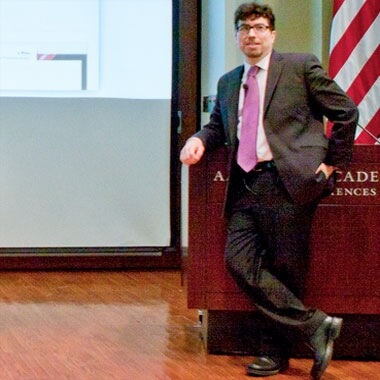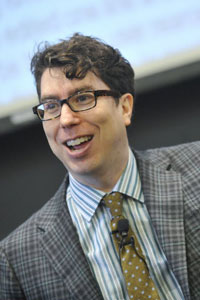News
Jonathan Zittrain advocates "dealing with cybersecurity problems through technically facilitated mutual aid among many participants, rather than solely top-down mandates or rigid best practices." (Photo by Eliza Grinnell, SEAS Communications.)
Internet guru and Harvard professor Jonathan Zittrain was named among the 100 Foreign Policy Global Thinkers for 2012.
The editors of Foreign Policy,a print and online source for international politics and global affairs, noted that "more than anyone, Zittrain has asked who the Internet's public and private gatekeepers are, how they're acting, and what that means for the future of the open web."
At Harvard, Zittrain crosses several fields, programs, and schools. He is a Professor of Law at Harvard Law School and the Kennedy School of Government, co-founder of the Berkman Center for Internet & Society, and Professor of Computer Science at the Harvard School of Engineering and Applied Sciences (SEAS).
In the Foreign Policy special report he was hailed as "the general counsel of the digital age" as he continues to tackle some of the thorniest problems in cyberspace such as: "Is Internet access a human right? How do we respect the rights of the unwitting people who become the subject of Internet memes? Is it legal for an insurance company to set rates for its customers based on GPS data?"
Zittrain is a member of the Board of Trustees of the Internet Society and is on the board of advisers for Scientific American. He is also a member of the Council on Foreign Relations and a Forum Fellow of the World Economic Forum, which has named him a Young Global Leader.
Previously, he was Professor of Internet Governance and Regulation at Oxford University.
Zittrain's research interests include issues related to digital property and content, cryptography, electronic privacy, and the roles of intermediaries within Internet architecture. His 2008 book The Future of the Internet—And How to Stop It focuses on the future of the now-intertwined Internet and PC.
The annual list from Foreign Policy, including such luminaries as Bill Gates, Hillary Clinton, and Sheryl Sandberg, "presents a unique portrait of 2012's global marketplace of ideas and the thinkers who make them."
Topics: Computer Science
Cutting-edge science delivered direct to your inbox.
Join the Harvard SEAS mailing list.
Scientist Profiles
Jonathan Zittrain
George Bemis Professor of Law




